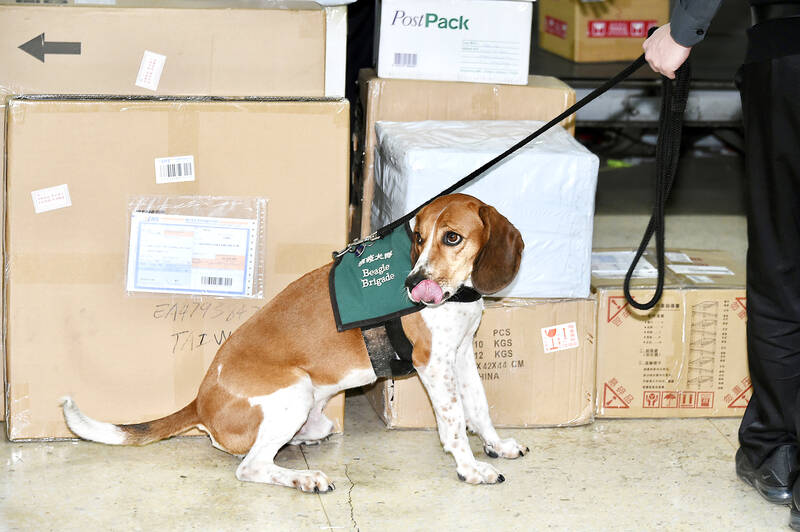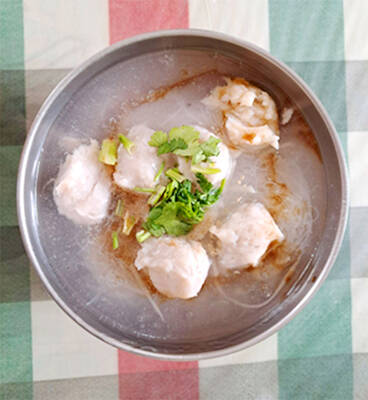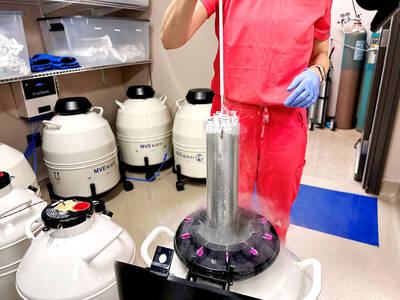A: Hey, what are you writing about?
B: I’m planning my trip to Japan next week. Do you need anything from there?
A: I love Japanese soft boiled eggs and deep-fried chicken skin. Can you buy some for me?

Photo: Tu Chien-jung, Liberty Times 照片:自由時報塗建榮
B: I’m afraid I can’t! According to the Bureau of Animal and Plant Health Inspection and Quarantine, travelers can’t bring any meat products made from land animals into Taiwan.
A: 你在寫什麼啊?
B: 我下星期要去日本玩,正在計劃旅遊行程。要幫你帶東西嗎?
A: 我最愛吃日本溏心蛋和炸雞皮,你能幫我買嗎?
B: 不行啦!根據「動植物防疫檢疫局」的規定,這些含有禽畜肉類成分的產品,都不能入境唷。
(Translated by Eddy Chang, Taipei Times/台北時報張聖恩)

A: Also, police seized seven pornographic videos featuring minors that entertainer Mickey Huang purchased in his hard disc. B: That’s just outrageous! A: His ex-girlfriend entertainer Little S and some others are calling for a legal amendment to increase the penalty. B: The buyers and sellers should both be punished heavily. A: But the porn sellers’ Web sites are mostly overseas, so they are hard to catch. A: 此外警方也在黃子佼的硬碟裡,查到7部他買的未成年色情片。 B: 真是令人火大! A: 他的前女友小S等人,還呼籲修法,加重相關的罰則。 B: 購買者和販賣者雙方都該重罰。 A: 不過色情網站大多設在海外要抓也不容易吧。 (By Eddy Chang, Taipei Times/台北時報張聖恩)

Jumping rope has long been considered an excellent form of exercise. It not only burns calories but also improves cardiovascular health and __1__ core muscles. Anyone who has used a traditional jump rope, though, knows that it requires a certain level of skill and coordination. However, with the development of the cordless jump rope, this is __2__ the case. The cordless jump rope is an innovation in the fitness industry that has gained popularity in recent years. As its name suggests, it doesn’t have a cord connecting the two handles. Instead, each handle features a short cord with a

Let’s explore another delicacy primarily known to Tainan locals: floating milkfish in thick soup. Despite its peculiar name, this dish is another Tainan specialty that showcases the popularity of milkfish, which is made into fish paste and served in thick soup. Unlike the version with tutuo fish, which also adds other ingredients to its thick soup, the floating milkfish version primarily features the “floating fish” itself in its thick soup, ensuring that the fish paste remains the star of the dish. 讓我們來探索另一道台南人熟悉的美食:浮水魚羹。這道菜名奇特的美食,再再展現了台南虱目魚料理的多樣。浮水魚羹是用虱目魚漿做成的羹品,雖然和𩵚魠魚羹一樣是羹湯,但不像𩵚魠魚羹會在湯中加入其他食材,而是讓虱目魚漿成為這道料理的主角。 peculiar (adj.) 獨特的;古怪的 The belly of a milkfish is considered the most

The practice of freezing embryos as part of in vitro fertilization (IVF) was thrown into chaos in Alabama this year, when the state supreme court ruled that such embryos should be considered children, exposing clinics to wrongful death claims in the event they are destroyed in the thawing process. In 2021, more than 80 percent of US IVF procedures involved the transfer of frozen embryos, according to a recent report by the US Department of Health and Human Services. HOW IS EMBRYO FREEZING USED IN IVF? IVF uses high doses of hormones to stimulate ovaries to produce as many eggs as possible. Once